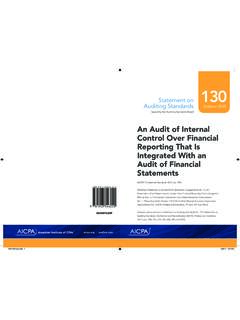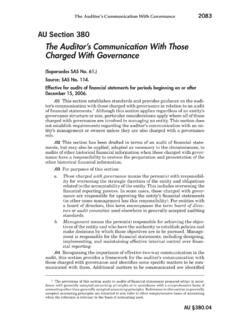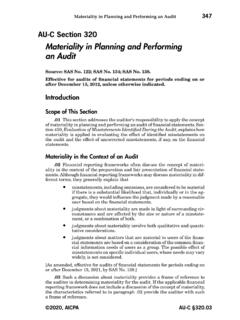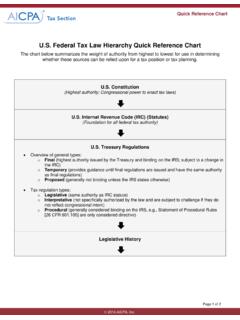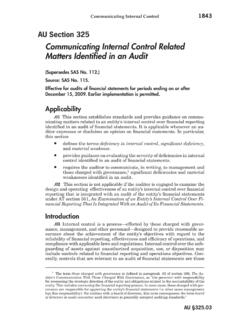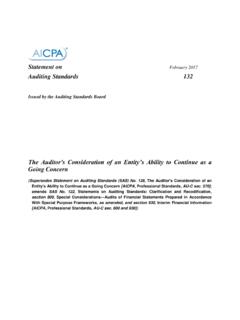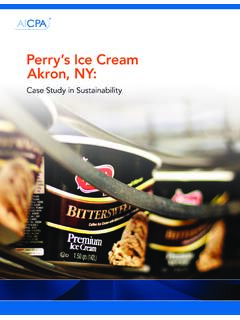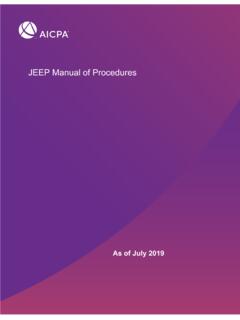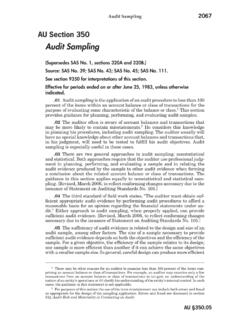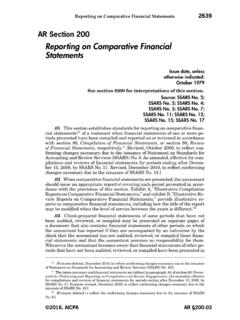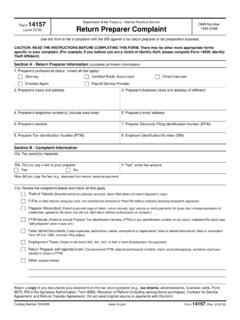Transcription of Third-Party Verification Letters: Questions and Answers
1 October 2013 Financial Reporting Center Industry Insights Third-Party Verification Letters: Questions and Answers Increasingly, CPAs are receiving requests from clients, lenders, mortgage brokers, health and life insurance providers, adoption agencies, regulators, and various other government and nongovernment agencies to confirm client information. In turn, the AICPA has received several inquiries from CPAs on what they often refer to as comfort letters. However, AU-C section 920, Letters for Underwriters and Certain Other Requesting Parties (AICPA, Professional Standards), defines a comfort letter as a letter issued by an auditor in accordance with AU-C section 920 to requesting parties in connection with an entity s financial statements included in a securities offering.
2 The requests that CPAs are actually receiving from third parties pertain to Verification letters. The requested information may relate to a pending loan, employee medical insurance, child adoption applications, or use-tax certification. Mortgages originated by private mortgage companies, which were resold to Fannie Mae and Freddie Mac and past due, are subject to required quality reviews. Quality review standards may require the mortgage originator to contact CPAs whose Third-Party Verification is contained within the loan file to confirm the statements made in such letters. In most cases, CPAs are asked to provide a confirmation letter containing specific language, a Verification statement, or a certification form.
3 Due to the increase in requests, CPAs find that this process is becoming more and more confusing, and information regarding Third-Party Verification is increasingly important to assure that practitioners are providing optimal services. In response to frequently asked Questions regarding Third-Party Verification letters, the following are responses to those Questions most commonly asked..01 What is the basic concern surrounding a CPA providing a Third-Party Verification letter or certification? CPAs have often been asked to provide Third-Party Verification letters. When a lender or other requesting organization requests factual information, a CPA may provide it, as long as the CPA is not breaking client confidentiality.
4 However, when a lender wants the CPA to provide any assurance on matters relating to solvency, the CPA is prohibited from doing so. It is a violation of AICPA attestation standards and, therefore, an ethical violation. Certification of tax information presents additional challenges. See Questions .02 and .07 .10, which address many of the tax issues involved..02 Can a member provide client tax information in response to a request for information or Verification from a third party ? Rule 301, Confidential Client Information, (AICPA, Professional Standards, ET sec. 301 par..01), prohibits a member from disclosing confidential client information without the specific consent of the client.
5 Internal Revenue Code (IRC) Section 7216 and Treas. Reg. Section actually makes it a crime for a tax preparer to disclose client tax return information to a third party without signed written consent from the client in a format specified by the IRS in Rev. Proc. 2013-14. More information and details regarding the specific wording and format can be found at the IRC Section 7216 Information Center on the IRS website. As a result, the short answer is no a member cannot provide client tax information to a third party absent express written authorization from the client in a specified format. For many clients, contacting the CPA is a matter of convenience.
6 They contact their CPA to avoid having to reorganize, consolidate, or filter through their own records. As an alternative to the strict procedures required by IRC Section 7216, many practitioners send the specific information being requested directly to the client in a convenient, readily accessible format (for example, a copy of the federal return as a separate PDF document). This allows clients to quickly and conveniently provide the requested information to the third party on their own..03 I ve been asked to supply Verification of my client s solvency. Where can I provide the reasons for why these letters are prohibited and what types of services are permissible?
7 Interpretation No. 2, Responding to Requests for Reports on Matters Relating to Solvency, of AT section 101, Attest Engagements (AICPA, Professional Standards, AT sec. 9101 par..23 .33), describes why a CPA is prohibited from providing any assurance on matters related to solvency. TIS section , Lender Comfort Letters (AICPA, Technical Practice Aids), also provides nonauthoritative guidance..04 Isn t the decision to supply a Verification letter a matter of my own understanding of the transaction and an evaluation of the risk of providing the letter ? There is no standards issue with providing factual information, as long as the CPA doesn t violate client confidentiality.
8 If any person or group asks for assurance on matters related to solvency, the CPA cannot provide it. It is a violation of AICPA attestation standards and, therefore, an ethical violation. Providing assurance on solvency is not a decision about risk it s an ethics violation. As mentioned in a previous question and answer, there are ways to act as the client s trusted adviser without providing comfort for solvency while still managing the risk of being sued and following professional standards..05 Can the AICPA address the problem of solvency requests with the lenders, such as national and community lenders and mortgage brokers who require them?
9 Can the AICPA persuade lenders, government agencies, and others to prohibit this request? The AICPA is working with banking trade associations and other regulatory agencies on behalf of CPAs to explain the sensitive issues surrounding solvency opinion letters and what kinds of Verification CPAs can provide outside of matters relating to solvency. Although we can attempt to address the issue with those entities at their national or state level, often, it is at the branch level or some independent third party (broker) that is making the request. Most major banks have no such requirement, and the government-sponsored entities (such as Freddie Mac and Fannie Mae) have already rescinded such requests from their servicing guides; yet, this practice still remains.
10 The AICPA Accounting and Auditing Technical Hotline1 provides members with free, high-quality technical assistance. The hotline is available from 9 to 8 ET at Additionally, Questions may be submitted online by filling out the hotline form..06 A bank has sent a form that requires me, as the accountant, to fill in certain information, such as Verification of income. What can I do? A broker or lender may be satisfied with a copy of the client s income tax return . However, as explained in preceding question .02, Ethics Rule 301 of the AICPA Code of Professional Conduct prohibits a member from disclosing confidential client information without the specific consent of the client.
